|
|
|
Sort Order |
|
|
|
Items / Page
|
|
|
|
|
|
|
| Srl | Item |
| 1 |
ID:
086328
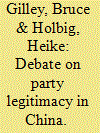

|
|
|
|
|
| Publication |
2009.
|
| Summary/Abstract |
We report results here from a mixed quantitative-qualitative analysis of 168 articles published in China on the question of regime and party legitimacy. We find that ideology remains a leading strategy of future legitimation for the CCP, alongside better known strategies of institution-building and social justice. We also find that liberalism, while less often proposed, remains a potent critique of regime legitimacy. We use these results to make predictions about the evolutionary path of institutional change of China's political system, linking up Chinese elite debate with the wider scholarly debate of authoritarian durability.
|
|
|
|
|
|
|
|
|
|
|
|
|
|
|
|
| 2 |
ID:
188555
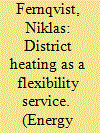

|
|
|
|
|
| Summary/Abstract |
With expanding solar and wind power production, the topic of flexibility services attracts increased attention in the Swedish energy system. In this context, the potentials in using thermal storage capacities in district heating (DH) systems have been brought forward, primarily by academic scholars. Using a ‘grounded’ approach, this study investigates if professionals assigned to Swedish DH companies and electricity distribution system operators utilise, or plan to utilise, DH systems as flexibility services for the electricity grid. Original data was collected through semi-structured interviews, held with fourteen individuals affiliated to different actors in the Swedish energy system. These individuals were identified as being experts, or practically engaged, in using DH utilities as flexibility services for the electricity grid. The findings show that although technologies for coupling between DH systems and the electricity grid are already in place, initiatives for using DH systems as flexibility services for the electricity system are rare in Sweden. Coupling challenges stem from ownership and operation legislation frameworks, marginal incentives and a widespread focus on firm benefits rather than energy systems benefits. Identified initiatives for using DH systems for flexibility services are primarily run on a local scale, designed and propelled by small groups of engaged individuals.
|
|
|
|
|
|
|
|
|
|
|
|
|
|
|
|
| 3 |
ID:
139828
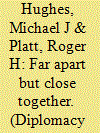

|
|
|
|
|
| Summary/Abstract |
A good deal has been written about the organisation and structure of the British diplomatic establishment since 1945. This analysis uses detailed quantitative and qualitative data to develop an understanding of the background and career trajectories of the most senior figures in the Diplomatic Service in 1975. By tracing their careers, it is possible to identify more precisely than before the changing educational and social background of these individuals when compared with previous generations of diplomats. This analysis also examines certain core features of the culture of the diplomatic establishment during the post-war decades, analysing how it both shaped and was shaped by particular structures and practices. Despite the existence of a peripatetic career structure that dispersed members of the diplomatic establishment around the globe, there were still numerous opportunities for the kinds of personal contact necessary to maintain an integrated culture.
|
|
|
|
|
|
|
|
|
|
|
|
|
|
|
|
| 4 |
ID:
156240
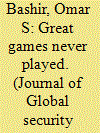

|
|
|
|
|
| Summary/Abstract |
Why do energy-hungry states nevertheless choose not to compete over energy resources? Contrary to the initial expectations of scholars and analysts, major changes in global energy supply have sometimes failed to spark “great games.” This paper presents an explanation for variation in competition, arguing that shifts involving energy touch off competition only when they affect political power between rivals in specific ways, when they do not result in beneficial effects that outweigh concerns about power, and when the cost of competition is bearable. After clarifying the concept of power in the energy issue area, the article applies this explanation to US decisions during four major post-Cold War developments in oil or natural gas, illustrating why American decision-makers chose to engage in competition with Russia or China in only half of these instances. The article concludes with implications for US grand strategy.
|
|
|
|
|
|
|
|
|
|
|
|
|
|
|
|
| 5 |
ID:
110025
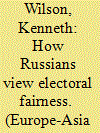

|
|
|
|
|
| Publication |
2012.
|
| Summary/Abstract |
There is a broad consensus that the Duma and presidential elections held in Russia in 2007-2008 failed to meet internationally recognised democratic standards. Post-election public opinion surveys, however, show that most Russians thought that the elections were mainly fair. This discrepancy between the views of international observers and of Russians themselves has not been adequately explained. The main aim of this article, utilising data from a series of focus groups, is to identify potential explanations for why so many Russians assessed these elections as fair, when there was so much evidence to the contrary. Why did so many Russians view egregiously unfair elections as fair? What, furthermore, can this tell us about Russians' political values and what are the possible implications of this for Russia's political development?
|
|
|
|
|
|
|
|
|
|
|
|
|
|
|
|
| 6 |
ID:
190997
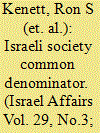

|
|
|
|
|
| Summary/Abstract |
The core of this article is the search for an ‘organizing principle’ for the State of Israel in the present era. To approach this core goal, it conducted 40 interviews with well-known and influential Israeli individuals and attempted to identify common grounds of Israeli society. Analysis of the interviews finds a broad common denominator among those with a wide variety of opinions, which is closely linked with the major principles of the Declaration of Independence of the State of Israel.
|
|
|
|
|
|
|
|
|
|
|
|
|
|
|
|
| 7 |
ID:
130997
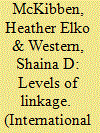

|
|
|
|
|
| Publication |
2014.
|
| Summary/Abstract |
Decisions in international institutions such as the European Union (EU) are often made by consensus, even when it is not required. Tit-for-tat exchanges provide an explanation for this phenomenon, as such exchanges can help to build up support for agreements states might otherwise not have had an incentive to support. Tit-for-tat exchanges are typically analyzed as trades of support across agreements. However, we argue that the priority of negotiators to further their national and bureaucratic interests makes exchanges across micro-level issues within a single proposal for agreement more prevalent than exchanges across agreements. Using both qualitative and quantitative analyses, we show that such within-agreement, rather than cross-agreement, linkages are related to an increased likelihood of consensus across an array of different EU agreements. To understand consensus in international institutions, more broadly, it is therefore necessary to look at the substantive issues at stake within each agreement
|
|
|
|
|
|
|
|
|
|
|
|
|
|
|
|
| 8 |
ID:
135263
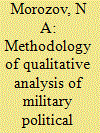

|
|
|
|
|
| Summary/Abstract |
The paper covers the general methodology points of qualitative analysis of military political systems underlying aggregate assessments of possibilities for resolving conflicts and making recommendations for the concepts of weapons (Forces) employment in strategic Operations. It also examines the main tasks of the methodology, and the areas and limits of its application.
|
|
|
|
|
|
|
|
|
|
|
|
|
|
|
|
| 9 |
ID:
187995
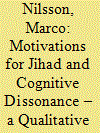

|
|
|
|
|
| Summary/Abstract |
This study is based on interviews with three former Swedish jihadists, and it uses cognitive dissonance theory to analyze how their motivations for jihad changed—from the early stages of radicalization to fighting as part of a jihadist group and finally leaving jihad. It argues that cognitive dissonance is a causal mechanism, alternative to empathy and collective relative deprivation, that can explain how individuals with collective identities can be motivated to opt for jihad. For none of the interviewees did fundamentalist Islam provide a gateway into jihadism, nor did they seem to use Islam as a mere justification for violent behavior. Cognitive dissonance can also shed light on why some jihadists have not been susceptible to further radicalization by accepting even more radical ideas.
|
|
|
|
|
|
|
|
|
|
|
|
|
|
|
|
| 10 |
ID:
087573
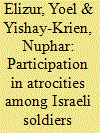

|
|
|
|
|
| Publication |
2009.
|
| Summary/Abstract |
Atrocities committed by soldiers are a common occurrence that harms not only victims, but also perpetrators, armies, and nations. However, censorship, limited access to information, and the tendency to deny one's evil and project it onto the other impede investigation into how ordinary soldiers cross the line between legitimate fighting and excessive violence. This study examined processes associated with Israeli soldiers' brutal behaviors during the first Intifada. Participants were 21 male combat veterans of two companies stationed in Gaza whose sampling reflected diversity in Israeli society and a wide range of behaviors in the Intifada. Situational factors and social-psychological processes (i.e. modeling, moral disengagement, dehumanization, and deindividuation) were powerful inducers of brutality. The data also showed individual differences in violence, inner-outer directedness, and moral standards. Consequently, five subgroups were identified: Callous/Impulsive, Ideologically Violent, Followers, Restrained, and Incorruptible. The use of these categories to examine the soldiers' unfolding experience over time generated a unique perspective into two less studied dynamics. The first was a synergistic interaction between dispositional and situational factors, manifested in level of brutality and differential subgroup stability of violent behaviors over time. The second was the company as a family-like primary social system that developed inner culture and structural patterns characterized by alignments and social power. Initially, there evolved a culture of brutality with an associated leadership that escalated the violence. A later clash with soldiers who adhered to the army's professional culture transformed the company's culture and structure. This analysis has implications for preventive measures, including the development of morally committed and resolute leadership at both lower and higher echelons of command.
|
|
|
|
|
|
|
|
|
|
|
|
|
|
|
|
| 11 |
ID:
179839
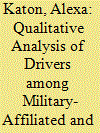

|
|
|
|
|
| Summary/Abstract |
This qualitative study explored and compared factors that drive individuals with and without military experience to commit violent acts of terrorism within a sample of 10 jihadism-inspired lone actors. Findings reveal four major themes driving violent terrorist action among lone actors: Action, Grievance, Growing in Jihad, Religious Fervor. Results also provide some of the first evidence that drivers of lone actor terrorism differ between those with and without military experience. Factors related to action, certain grievances, and growth in Jihad were seen more commonly among the military-affiliated lone actors than their civilian peers. Implications for policy and prevention are discussed.
|
|
|
|
|
|
|
|
|
|
|
|
|
|
|
|
| 12 |
ID:
150775
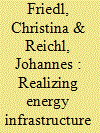

|
|
|
|
|
| Summary/Abstract |
The federal state of Upper Austria, at a crossing point for European energy grids, provides large-scale resources for storage of natural gas and is among the top infrastructures in this regard in Europe. Considering the ambitious plans for enhancements of energy infrastructures in this region, the issue of social acceptance of energy infrastructure is crucial. To foster an understanding of the challenges inherent in this issue we present an analysis concentrating on the social acceptance of energy infrastructure projects in Upper Austria. This paper addresses the issues with realizing energy infrastructure projects and analyzes the problems and benefits based on an empirical–qualitative study comprising expert interviews, discussions with stakeholders, and a round table workshop integrating the disparate viewpoints. The aim of the process was to integrate different attitudes, perspectives and positions of relevant stakeholders, members of citizens’ initiatives, environmental organizations and of the national government and local authorities. The results presented are based on both the analysis of the empirical–qualitative data and the existing studies and literature on social acceptance. The qualitative research compares experiences and current practices with social acceptance issues (like frameworks, participation, communication strategies) in a set of considered energy infrastructure projects.
|
|
|
|
|
|
|
|
|
|
|
|
|
|
|
|
| 13 |
ID:
127220
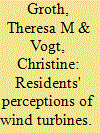

|
|
|
|
|
| Publication |
2014.
|
| Summary/Abstract |
Wind energy development has become a 'hot topic' across Michigan as this state seeks to achieve 10% of energy delivered to consumers from renewable sources (Huron County Planning Commission, 2005). The focus of this effort to generate renewable energy has centered around wind energy. Wind turbines have been constructed at numerous locations across the state. The lower peninsulas' eastern counties near Lake Huron and Saginaw Bay were designated by the Wind Energy Resource Zone board as one such area of strong sustained wind in the state. Turbines have been constructed in 'pockets' across this 'thumb' region, yet half a decade after the first turbines were constructed, negative perceptions are still attributed to wind turbines. This paper examines residents of wind farm locations as a whole and independently as groups (those in opposition and in support of development) to identify what, if any similarities and differences, exist between the residents' perceptions. Qualitative analysis on stated negative perceptions unveiled common issues with residents: increased price of electricity with wind energy, noise from the turbine rotation and uncertainty surrounding the long term effects of wind turbines. These areas of concern seem to persist years after construction was completed.
|
|
|
|
|
|
|
|
|
|
|
|
|
|
|
|
| 14 |
ID:
110668
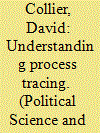

|
|
|
|
|
| Publication |
2011.
|
| Summary/Abstract |
Process tracing is a fundamental tool of qualitative analysis. This method is often invoked by scholars who carry out within-case analysis based on qualitative data, yet frequently it is neither adequately understood nor rigorously applied. This deficit motivates this article, which offers a new framework for carrying out process tracing. The reformulation integrates discussions of process tracing and causal-process observations, gives greater attention to description as a key contribution, and emphasizes the causal sequence in which process-tracing observations can be situated. In the current period of major innovation in quantitative tools for causal inference, this reformulation is part of a wider, parallel effort to achieve greater systematization of qualitative methods. A key point here is that these methods can add inferential leverage that is often lacking in quantitative analysis. This article is accompanied by online teaching exercises, focused on four examples from American politics, two from comparative politics, three from international relations, and one from public health/epidemiology.
|
|
|
|
|
|
|
|
|
|
|
|
|
|
|
|
|
|
|
|
|